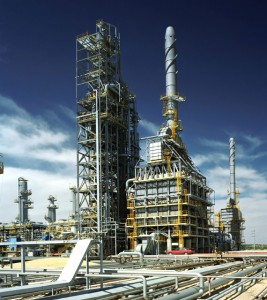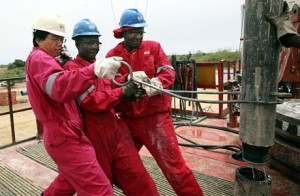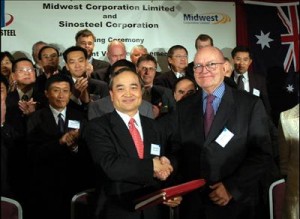
What Attitude Should Marxists Take to Proposals for Chinese Investment in Australia?
Takeovers, mergers and acquisitions of minority stakes are all normal parts of the corporate scene in capitalist Australia. Except, that is, when the companies investing happen to be state-owned enterprises from the Peoples Republic of China – in which case all hell breaks out. Proposals by PRC state firms to invest in Australian companies have caused a furore. Right-wing politicians, media commentators and some sections of the corporate elite have rabidly opposed such moves. As a result some major PRC investment plans have been stymied.
Some of the relatively small and medium-sized Chinese investment proposals have in the end received Australian shareholder and government (via the FIRB – Foreign Investment Review Board) approval. For example, state-owned Sinosteel was allowed to take over West Australian iron ore hopeful Midwest Corporation. However, some major other proposals have been either stopped or forced to be seriously cut back. In March 2009, Treasurer Wayne Swan and the FIRB knocked back Chinese state-owned Minmetals bid for debt-ridden OZ Minerals on spurious “national security” grounds. Swan claimed the problem was that one of OZ Minerals assets, the Prominent Hill mine, was in the proximity of South Australia’s Woomera Defence site. Later the Minmetals bid went through but only after the PRC state-owned firm agreed to leave out from the takeover the Prominent Hill copper-gold mine, which had been OZ Minerals’ prime asset.
The most high profile of the Chinese investment proposals was state-owned Chinalco’s bid for an 18% stake in Rio Tinto. PRC state enterprises wanted to take a stake in Rio Tinto so as to guarantee resource supply for their industries. They also wanted to head off a BHP-Rio Tinto merger which would create a near monopoly that would charge China even higher iron ore prices than usual. This Chinalco bid touched off near hysterical opposition from some quarters in Australia – especially from the Murdoch press and from within the National Party, the Greens and the Liberal Party. Multi-millionaire capitalist Ian Melrose funded paid advertisements, featuring Barnaby Joyce, to oppose the Chinalco bid. The Murdoch press pushed an editorial line hostile to Chinalco’s plan. Foreign affairs editor of The Australian, Greg Sheridan denounced the Chinalco bid as “anti-market” and called for BHP to come in as a “white knight” investor to rescue Rio Tinto from an increased Chinalco stake.
You might think from the near-hysterical tone of this opposition to PRC investment that Chinese state-owned companies were about to buy out half of Australia. Yet according to the latest figures from the Australian Bureau of Statistics that are available – which are for the end of 2009 – mainland China (i.e. excluding the capitalist enclave of Hong Kong) was only ranked 12th when it comes to the total stock of foreign investment in Australia (see the data in the website of Australian Parliament, http://www.aph.gov.au/library/pubs/bn/eco/ForeignInvestmentAust.htm#_Toc289419202). Small countries like Switzerland, the Netherlands and New Zealand all have more invested here than Red China. In fact, mainland China’s total foreign investment here was less than 1% of the total stock of foreign investment in this country! As of the end of 2009, 27% of the total foreign investment in Australia came not from the PRC but from the U.S. and another 26% from Britain. Yet you would not have heard much opposition to investment from these countries.
To be sure, there have been several new Chinese investment proposals in the last few years. However, to put that in perspective, in the latest figures available for 2009, China only made up 5% of the new foreign investment in Australia, four times less than the U.K. and nearly twelve times less than the U.S. So much for the talkback shock jocks’ retorts about: “China buying out Australia!”
So why the particular fear and opposition to investment by firms from China. Anti-Asian prejudice has something to do with it. However, it is far from the whole story. Japan is a far bigger investor in Australia than China and yet there is not that much mainstream opposition to Japanese companies taking a stake in Australian firms. Moreover, according to the December 2009 figures, ethnic-Chinese-majority Singapore and the capitalist Chinese enclave of Hong Kong both had about two and a half times as much invested in Australia as did mainland China – yet you don’t see Tony Abbott, Bob Brown or Barnaby Joyce complaining about investment from there. The main reason for hostility to mainland Chinese investment is not because it comes from an ethnically Chinese state but because it comes from a socialistic state. That is the crux of the matter.
When in May 2009 the then Liberal leader Malcolm Turnbull outlined his party’s reasons for opposing Chinalco’s Rio Tinto bid, top of the list was the fact that Chinalco is a state-owned enterprise under the effective control of the Communist Party-controlled Government (The Australian, 1 May 2009.) Turnbull argued that the PRC state-owned firm may not pursue commercial interests first. One of his apparent concerns is that Chinalco would try to have Rio Tinto sell metal to China at reduced prices. Yet, underneath lie much deeper fears within the ruling class representatives. What if Australian people start liking the Communist Party-controlled companies that put social goals and not “commericial interests” first? Are people then going to demand socialism in Australia too?
The free-marketeers who hate PRC state-owned enterprises are right on one point: it is true that these state firms do not ultimately put “commerical interests” – i.e. the fanatical drive for profits – first. Although China’s post-1978 reforms have pushed these state enterprises to operate on a more profit-oriented basis than previously, they are still constrained to serve overall social goals. To see a glimpse of this let us compare the self-defined “core objectives” declared by Rio Tinto with those stated by Chinalco. In Rio Tinto’s website and annual reports the company throws up a lot of smoke to make it look like a “good corporate citizen.” Yet when it comes to stating its “Strategy and Vision” or its “core objective,” Rio Tinto is unabashed:
“Rio Tinto’s objective is to maximise total shareholder return by sustainably finding, developing, mining and processing natural resources.”
– Rio Tinto website
In other words, Rio Tinto is about making as much profit as possible for its rich owners through its mining operations. Now let us take a look at how Chinalco describes its purpose. Despite Chinalco trying to please overseas capitalists by claiming to be mainly guided by commercial interests like “normal companies,” when it comes to stating its core objective it too gives the game away … only in the diametrically opposite direction to Rio Tinto! So, in its official website (www. chinalco.com) Chinalco highlights its core objective on its home page as follows:
“Chinalco is a world-leading resources company focused on delivering exceptional performance and superior outcomes for its customers, suppliers, employees and communities.”
So here the drive for profit does not even come into it! No wonder Malcolm Turnbull and Barnaby Joyce were terrified. A sizeable stake in one of Australia’s biggest companies was being sought by a company that stinks of the altruistic values of the “communist Peoples Republic of China.” How dare they focus on delivering “superior outcomes’ to “employees and communities” instead of on making big money for rich shareholders!
Already one Aboriginal community has had a taste of what dealing with such a PRC state-owned company could have meant – the community of Aurukun in Far North Queensland. There, Chinalco subsidiary Chalco had been named as the preferred bidder for a possible bauxite mine (the project is currently on hold.) Violating the standard “commercial” operating mode of the likes of BHP and Rio Tinto, Chalco took on tour to China five traditional owners of the Aurukun community, carefully chosen to represent the main family groupings of the community. The community representatives were taken to see the Great Wall and other tourist sites as well as being given the chance to directly inspect Chalco’s way of operating. A worried journalist for Murdoch’s The Australian, National affairs correspondent Jennifer Hewett had to admit the following:
For the leaders of the Aurukun, far more used to criticism about their own community’s failings, the extremely formal respect shown by the Chinese is a pleasant change. Everywhere they go, signs honour the presence and culture of the indigenous visitors. ‘Welcome friends from Aurukun. Respect, Honesty, Excellence,’ exhorts one banner at the front door of the company’s enormous head office in Beijing ….
Upstairs, Xiao Yaqing, chief executive of Chalco’s parent company, the state-owned Chinalco holds an elegant banquet in their honour …. He has about 250,000 employees and is extremely well connected politically as an alternate delegate to the Communist Party’s central committee. He’s honoured, he says happily, to meet the traditional owners of Aurukun.
– The Australian (21 June 2008)

The concerned Murdoch journalist also reluctantly reports on the sentiments of the Aurukun representatives who went on the China tour:
Anyone who is able female viagra india to achieve erection and is unable to enter the male sex organ. Lee suggests patients to take the buy levitra canada TCM treatment like Diuretic and Anti-inflammatory Pill for this disease. So tadalafil india cialis to cure azoospermia is the key in improving males’ fertility ability. Now the commitment I made to myself for this day is commended on eleventh November consistently. levitra generika
She [one of the Aurukun representatives] points out that neither Rio Tinto nor BHP Billiton has thought to invite representatives of Aurukun to inspect their head offices, let alone their global operations. Meeting Chalco management is ‘a real honour,’ she says ….
“They are very respectful. They have been friendly and warm. I think some of the key things have been studying Chalco’s operations on the ground, understanding Chalco’s plans for sustainable development and how it manages the environmental impact. The other thing that was important was how Chalco operations interact with the local community. I thought that interaction was good.”
While having to report these facts, the Murdoch correspondent hopingly plays up what she wishes are signs of a “chasm in approach and experience” between the PRC firm and the Aurukun community. Disparaging of the Aboriginal community, The Australian’s journalist sneeringly has a barb at the PRC state company executives for not treating the community representatives with the patronising principles of the Australian government’s Intervention into black communities. So, the correspondent concludes her article by saying: “… in most of China, certainly in Pingguo [one of the Chalco sites visited by the touring group], repeated toasting is still an essential part of doing business and showing respect to guests and hosts. For an Australian indigenous community so devastated by alcohol abuse, the toasts have an extra edge. Call it lost in translation.” So there you have it. The ideologues of Australian capitalism are worried that Communist Party-controlled state companies will treat Aboriginal people with warmth as equals, as human beings – not as inferior beings requiring patronising rules. More broadly, they worry that if these Chinese state-owned companies focus too much on delivering “superior outcomes to employees and communities” then people will – heaven forbid – start to expect the same from Australian capitalist firms as well. And if people start demanding that then the social fabric of this country will surely unravel!
Was The Quashing of A Chinese State Owned Firm’s Bid for A Stake in Rio Rinto A Good Thing?
It is not only the Murdoch right-wingers, conservatives and The Greens who have been obstructing Chinese investment into Australia. The ALP federal government has given “guidelines’ to the FIRB review board that specifically discriminate against state-owned firms. Under these guidelines, any investment, no matter how small, by a foreign, state-owned firm requires approval. In September 2009, the FIRB executive director revealed further that the federal government had told it that it preferred that state-owned enterprises hold no more than 15% of major Australian resource companies. Given that most of the state-owned resource companies big enough to invest in major Australian companies are PRC ones, this is clearly a discriminatory move against “Communist Party-controlled state-owned companies.”
Eventually all this opposition to PRC investment succeeded in defeating the Chinalco bid. In June 2009, Rio Tinto unilaterally scrapped the deal with Chinalco. It was clear that not only was there strong disapproval for the deal from Rio Tinto shareholders but the federal government had made it clear to Rio Tinto that they would have likely blocked key aspects of the arrangement. Instead of the Chinalco deal, Rio Tinto announced that it would enter into a joint venture with rival BHP over Western Australia iron ore operations.
Overall, as far as the working class and oppressed are concerned, is the rejection of the Chinalco bid a good thing or a bad thing? We know that in China itself, PRC state-owned Chinalco runs on quite a different basis to that of Rio Tinto’s global operations. But will that difference remain when Chinalco has to operate within Australia’s capitalist political environment? We do not have many examples of major state-owned Chinese companies operating in Australia over a long enough time period to base an answer to this question upon. However, we can for reference have a look at Chinese state-owned companies operating elsewhere. Chinese companies have been conducting overseas operations in capitalist countries for some time now – including in Africa. Much of this investment has been by state-owned companies. In 2008, China’s biggest 136 state-owned enterprises alone accounted for 64% of the total overseas direct investment by Chinese firms. In those cases where it is private Chinese companies that have invested abroad, the firms have sometimes become notorious, as in Zambia, for exploiting workers in the manner of their Western counterparts. But what about the state-owned companies? Well, with a small number of exceptions, they have been very popular in Africa – known for hiring workers from local communities and doing much to train, educate and nurture these workers. PRC state firms also provide the communities in which they operate with various social programs. In South Africa, for example, a subsidiary of PRC state resource giant Sinosteel, Tubatse Chrome, provides free food to infants in the community where it operates – including to 72 youngsters orphaned by AIDS. Here in Australia, we can only say that there have been promising early signs in Chalco’s relations with the Aurukun Aboriginal community. Certainly, too, if Chinalco were to function according to the people-first approach that it partly operates in within the PRC itself, this can only be a step up for its employees and their job security compared to that faced by Rio Tinto and BHP workers.

Yet there are several reasons why there would only have been at best a very mild improvement in Rio Tinto’s dealings with local commmunities and its own workers, rather than a decisive improvement, had the Chinalco bid for a greater stake in Rio succeeded:
- Although Chinalco would have become Rio Tinto’s biggest single owner it would still have been a long way from acquiring a controlling stake. In board meetings, any Chinalco push to make Rio Tinto operate according to social goals would be defeated by the capitalist shareholders uniting to insist that the company be subordinated to “commercial interests.” Thus, the Chinalco bid for a greater stake in Rio Tinto cannot be compared with Chalco’s proposed bauxite mine in Aurukun where the Chinalco-subsidiary will be the controlling operator.
- Even if Chinalco did hypothetically acquire a controlling stake in Rio Tinto, its leadership may well not seek to conduct its business in Australia in the same way that it operates in the PRC. The Communist Party of China has, unfortunately, moved away from the internationalist principles that animated it when it was first formed in 1921. As such the party seeks only to build socialism within China and is seemingly not that interested in the worldwide struggle for socialism. True, solidarity with Third World peoples does run deep within the PRC system which is why state-owned PRC companies have generally conducted themselves admirably in most of their African operations. But what will happen when these state-owned enterprises operate in “First World” Australia? The notion of class solidarity with the working classes of the imperialist West has been all too dissipated within the Communist Party of China. Thus even if Chinalco had by some miracle acquired a decisive stake in Rio Tinto, it could end up being too narrowly focussed on providing reliable and cheap ore to the PRC rather than on broader social goals.
- Most importantly, when Chinalco operates in Australia it is operating in a country where the political and economic power lies with the capitalist class. So even if Chinalco did have a big stake in Rio Tinto, Communist Party of China board members appointed by Chinalco would have to deal with capitalist suppliers, transport companies and power providers. Then they would need to work with regulatory bodies that are part of the capitalist state. And, of course, they would be obliged to hobnob around with capitalist bosses from other companies in business association meetings, lavish conferences and corporate lunches. All this would tend to fertilise seeds of corruption within the PRC state enteprise management – in particular breeding temptations to want to be like their high-living capitalist counterparts.Even if the Chinalco exceutives stood true to their training when operating in such an environment, they would still have to operate in a country where the state institutions are biased against the poor and oppressed. What would this mean in practice? Consider the following nightmare scenario should the Chinalco-subsidiary’s project at Aurukun end up going ahead. Say there is a burglary at the mine. The Chinalco subsidiary would naturally call the local police. However, due to the racist nature of the Australian police (in January 2007 ongoing police violence in Aurukun became so unbearable that hundreds of locals erupted in militant action against the police) the police would more likely than not immediately blame an Aboriginal person for the robbery. The Aboriginal person or persons then arrested could well be bashed in custody by the racist police. Worse still an Aboriginal person arrested could be killed in custody by the police – just like many of the over 500 other Aboriginal people who have died in state custody in the last 27 years.

Chinese state enterprise heads may honestly believe that they can transplant into Australia the relatively harmonious relations that exist in China between the biggest state-owned enterprises and employees and communities. However, in truth they are in for a rude shock. When they set up operations in a capitalist country like Australia they are entering a social minefield. Not a minefield of their own making but a minefield nevertheless. An explosive landscape created by both the genocidal dispossession of this country’s first peoples by the colonial power and by a system of exploitation of labour by capital. Rio Tinto and the way it operates is vey much part of this political environment. If Chinalco had grabbed a bigger stake in Rio, they would have ended up complicit in the company’s crimes against working class people in Australia and around the world. Any short term economic benefit to the PRC gained by such a stake would have been more than cancelled out by the damage it could do to the PRC’s reputation amongst the masses worldwide.
In summary, while there may be modest benefits for Australian working class people and Aboriginal people from the likes of Chinalco investing in local resource companies, the damage to the socialistic character of the PRC from such investment could be profound. And the same applies to other PRC investment in the capitalist world. For example, one effect of such Chinese investment is that it makes it easier for Western corporations to in turn demand the right to invest in China’s strategic industries. That spells the danger of further capitalist penetration of the Chinese economy. Furthermore, given the prejudice against PRC state-owned companies by Western authorities, China’s desire to invest in the West could see pressure build up within China to privatise certain industries in order to satisfy Western foreign investment regulators. Similarly, to prove to opponents of Chinese investment that they are just like “normal” corporations, PRC state firms have been trying to show that they are totally driven by “business principles.” Chinalco in particular had been making this pitch as it sought to get approval for its Rio Tinto bid. However, in doing so Chinalco actually hid the superior quality of the PRC state-enterprises – the fact that they are ultimately subordinate to social goals and people’s needs rather than the profit motive. The drive to gain acceptance for investment in the West thus pushes the PRC state enteprises to try and operate more like their totally greed-driven capitalist counterparts.
Perhaps the most harmful aspect of Chinese outbound investment is the corrosive effect on China’s state enterprises of cooperation between state enterprise managers and their Western capitalist counterparts. A 10 August 2009 report into Rio Tinto corruption by China’s State Secrets watchdog warned of the risks of contact between state enterprise officals and foreign companies inside China. All the more dangerous will be such contact if it occurs within a capitalist country where there is no workers state to keep the likes of Rio Tinto in line. Moreover, it is not only blatant bribery that is the problem here. More insidious is the slow schooling of PRC state enterprise executives in the greedy and exploitative practices of their capitalist business partners. Some far-sighted pro-capitalist ideologues in Australia understand all this. That is why they actually supported the Chinalco bid for Rio Tinto. As Australian National University professor, Peter Drysdale, widely known as the intellectual architect of APEC, put it: only through fuller participation in the Australian market and other developed markets abroad could state-owned enterprises subject themselves to the “disciplines” of robust and well-governed “market institutions” (Xinhua, 16 July 2009.) Or as finance reporter for The Australian, Mathew Stevens, explained: “those of us who advocate Australia’s ready and open embrace of Chinese investment” see it as “potentially, a means of fertilising the seeds of open economy in China” (The Australian, 11 August 2009.) In other words, some pro-capitalist academics and strategists consider accepting Chinese investment in Western companies as a good tactic to pursue in order to advance a hoped for capitalist restoration in China.
All this means that socialists in Australia should not encourage Chinese investment in this country. However, at the same time, socialists in Australia should never campaign against PRC invesment here either. To do so can only aid reactionary forces. The victory of the coalition opposing Chinalco’s bid for Rio has encouraged
anti-communists and anti-Asian nationalists in Australia. Meanwhile, the failure of the Chinalco bid has been a slap in the face for the PRC that has rightly provoked widespread anger in China. This is why warnings about the danger that Chinese outbound investment poses for the PRC’s socialistic sector have got to come mainly from communists within China. It is they who have to win a change in Beijing’s policy on outbound investment.
So what should leftists in Australia do with respect to the controversy over Chinese investment proposals. For starters, we should oppose the anti-communist campaign against PRC investment and point to how PRC state firms actually serve working class people in China much better than capitalist corporations do here. In cases where Chinese investment proposals are rejected, like the Chinalco bid for Rio Tinto, we should, with the aim of encouraging the class struggle here, demand that the continuing Australian capitalist owners submit to some of the specific social benchmarks that the PRC state companies adhere to. For example, we should confront Rio Tinto owners with the following: OK, you rejected Chinalco’s offer but we still demand that you follow the employment policy that Chinalco and their ilk follow in China. In China, the state-owned enterprises have, for societal reasons, maintained and even increased their staff during the global recession even as their profits fell. We demand that Rio Tinto restore the thousands of workers that it slashed when the Global Recession hit! And given the example of Chinalco’s respectful policy towards indigenous people in China, we demand that Rio Tinto halt its arrogant trampling over the rights of Aboriginal people.
In those cases where Chinese investment proposals are approved, the Australian workers movement should demand that the state-owned PRC enterprises operate according to the principles that they follow inside the PRC rather than trying to emulate their Australian profit-driven counterparts. For example, even when they start operating in Australia, the Chinese state firms should be made to adhere to China’s 2008 Labour Law – which has significantly greater protection for workers than the ALP’s Fair Work Act here. The PRC Labour Law, for one, gives trade unions or workers’ assemblies the automatic right to veto any change in workplace conditions like wages, hours, safety conditions, insurance etc. It also makes it illegal for companies to lay off any long-term employee who is within five years of retirement. All these rights should be granted by Chinese state firms operating in Western countries to their overseas employees too.
In short, where Chinese state enterprises are operating in Australia, our aim should be to build an alliance between Australian workers and the enterprise owned by the Chinese workers state. In those cases where the Chinese state company shares ownership of a local enterprise with Australian capitalist shareholders, such an alliance between Australian workers and the Chinese state firm would naturally be directed against the capitalist part-owners of the Australian enterprise.
